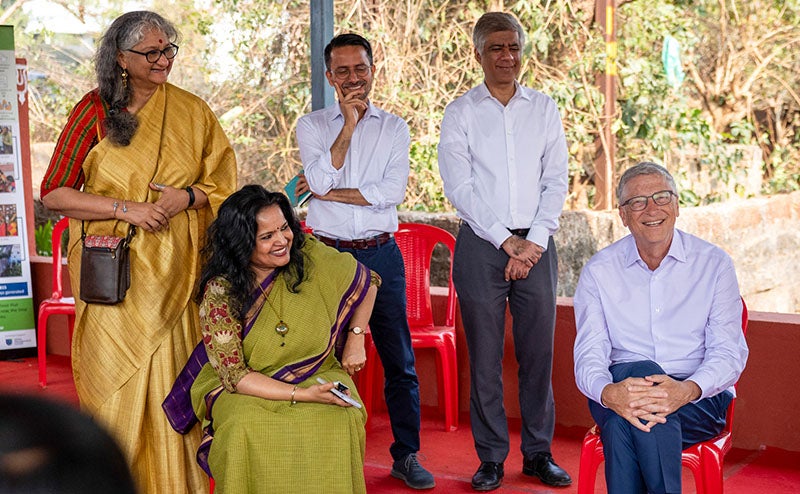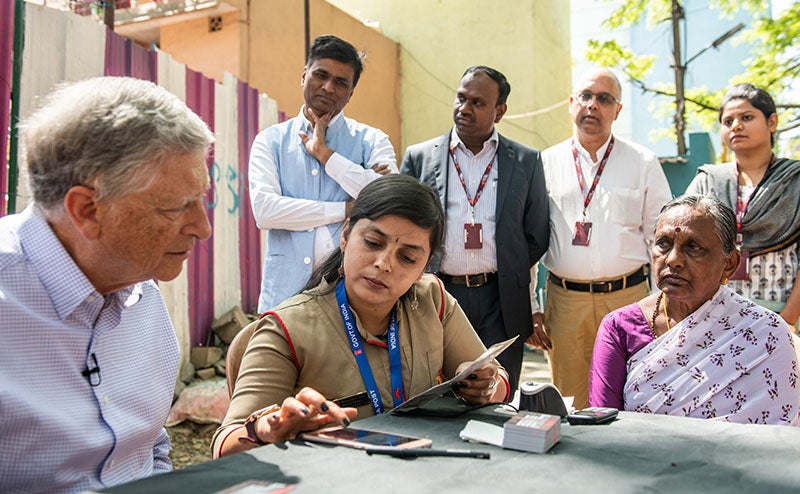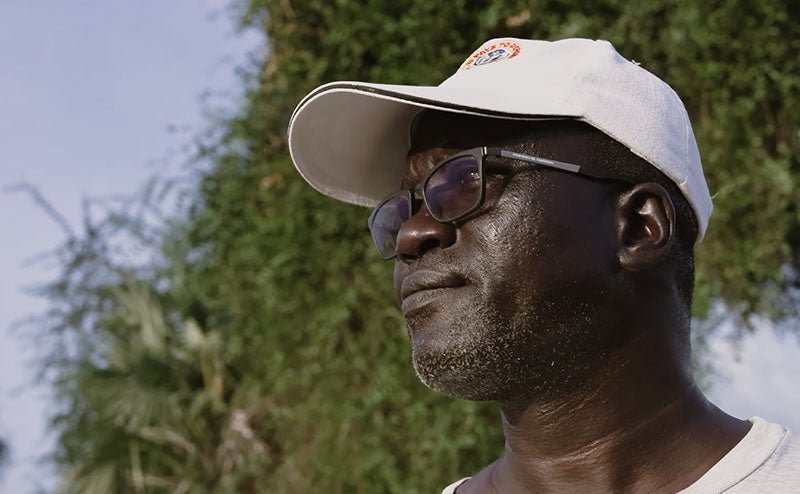I read all kinds of books, including ones that only the harshest college professors would assign.
Several huge global setbacks over the past few years have left many people discouraged and wondering whether the world is destined to keep getting worse. The pandemic and the invasion of Ukraine are just two examples. These setbacks are causing significant suffering.
But it is important to remember that they are happening in the context of two decades’ worth of historic progress. I believe it is possible to mitigate the damage and get back to the progress the world was making. In this post I will enumerate the progress and the setbacks, explain how the world can respond, and discuss how I and others can do our part.
Melinda and I started our foundation in 2000 to advance our vision that every person should have the chance to live a healthy and productive life. That same year, the world set an ambitious vision for improving people’s lives when it adopted the United Nations Millennium Development Goals and agreed to measurable targets for meeting those goals.
Over the next 20 years—thanks to efforts by governments, the private sector, non-profits, and philanthropies like ours—the number of children who died before their fifth birthday dropped by half, from 12 million per year to 6 million per year. The fraction of people living in extreme poverty also dropped by half. More children enrolled in school than ever. Deadly diseases such as HIV, TB, and malaria went into retreat, as the number of people who died from these diseases continued to fall. This progress was not limited to one region or to wealthy countries. It happened in dozens of countries all over the world from Bangladesh to Ethiopia to Ghana.
“Against this backdrop, the pandemic is one of the biggest setbacks in history.”
Against this backdrop, the pandemic is one of the biggest setbacks in history. The world was poorly prepared, so the damage is widespread. In addition to more than 20 million excess deaths caused by COVID— exacerbated by the inequity in vaccine distribution between high- and low-income countries—childhood deaths from all causes are going up because of disruptions to health systems. Polio eradication was set back several years. Students have lost as many as two years of learning in most countries. Emergency spending on the COVID response has left governments with large debts that will have to be paid off. Many countries are experiencing significant job losses, particularly among women. Women have had to bear most of the burden of taking care of children who were not in school.
The war on Ukraine is a gigantic tragedy for the entire world. Ukraine itself is experiencing the death and destruction of an intense war. The country will have to be rebuilt. The reduction in the supply of natural gas is driving up costs, such as the cost of electricity, particularly in Europe. The reduction in the supply of food—particularly wheat and edible oils—and the supply of fertilizer is driving up food prices, which will increase malnutrition and instability in low-income countries.
The world economy is entering a low-growth cycle, with rising interest rates and high inflation. Deficit spending will have to be reined in to reduce inflationary pressure. Government income will go down and more will be spent on interest payments, which will reduce the amount of money available for programs and make trade-offs necessary. Aid budgets will be stretched, and the poorest countries may see support cut at the time when they need it most. Many low- and middle-income countries have unsustainable levels of debt, particularly as their currencies weaken against the currencies they have borrowed in. Reducing these debts will be particularly hard because a significant portion of them is owed to China and the private sector, rather than traditional development banks, which makes it much more challenging to negotiate debt relief.
The damage from climate change is already worse than most models predicted. We are seeing a lot of bad weather events, including heat waves and lower agricultural output, particularly in countries near the Equator. Most countries are falling short of the climate commitments they have made. Hard-to-reduce emissions from agriculture/deforestation, buildings, and industrial production including cement and steel continue to go up, more than offsetting the reductions from electric cars and renewable energy. Low-income countries are hurt the most, even though they are responsible for only a small portion of the historical emissions.
We are facing all these global crises at a time of deep political polarization in the United States. The political divide limits our political capacity for dialogue, compromise, and cooperation and thwarts the bold leadership required both domestically and internationally to tackle these threats. Polarization is forcing us to look backwards and fight again for basic human rights, social justice, and democratic norms. I believe the reversal of abortion rights in the U.S. is a huge setback for gender equality, for women’s health, and for overall human progress. The potential for even further regression is scary. It will put lives at risk for women, people of color, and anyone living on the margins.
Response to setbacks
How can I possibly still be optimistic? I see incredible heroism and sacrifice all over the world. Medical workers put in unbelievable hours at great risk to themselves to help people infected with COVID. Incredible efforts are taking place to help refugees from the Ukrainian war and to help those caught in battle zones. Activists are courageously protesting and often risking their lives to protect people’s rights. People on the front lines inspire me to do whatever I can. Although each of us can only do so much, when lots of people join in we will resume progress.
We need all sectors of society—government, the private sector, and the non-profit sector including philanthropy—to engage on these issues. Philanthropy is the smallest of these sectors, but it is unique in its ability to try risky ideas that can have a large impact if they succeed and are scaled up.
I wish I knew how to help bring the war to a quicker end or to shorten the economic downcycle or improve our political capacity. I have an open mind to helping anyone who proposes how to improve these areas.
Personally, I am putting a lot of my energy and resources into innovators working on pandemic prevention, global health, climate mitigation (including getting rid of dependence on hydrocarbons) and adaptation, education improvement (including remediation), and food costs. When I say “innovation,” I’m referring to new products and services as well as new ways of delivering them to those in need—including by strengthening local leaders and institutions. These innovations will not come in time to avoid the problems altogether, but the faster we move, the less people will suffer. For many people including myself this is the most concrete way of contributing, even when it seems modest compared to the scale of the problems. Focusing on being part of the solution is better than giving up in despair.
Innovation areas
These are some of the areas where I think innovation can make a big difference with new tools and new ways of delivering them. These are areas where the groups I am involved with—the Bill & Melinda Gates Foundation and Breakthrough Energy (for climate mitigation)—are working with partners to come up with solutions, and the innovations I describe are all in the pipeline.
Preventing pandemics. Eventually, we will have vaccines that prevent infection (as opposed to reducing only the risk of getting severely ill or dying) and last for at least a decade. A vaccine that prevented infection would cut cases over half in countries with good vaccine coverage. (These vaccine advances will also allow scientists to make vaccines for TB and HIV.) A drug that blocks respiratory infection will be able to be deployed even faster than a new vaccine. The world should fund and staff a global group connected to the WHO doing monitoring so that outbreaks are stopped before they become pandemics.
Reducing childhood deaths. The world can get back to and even exceed the vaccine coverage levels we had before the pandemic, when 80 percent of children were being reached. There will be new vaccines for respiratory diseases and other conditions that threaten the lives of infants and children in low-income countries. A new generation of malaria-preventing bednets will help overcome the resistance that mosquitos have developed to the current generation. Researchers need to invent transformative tools, including more-effective vaccines and new ways of reducing mosquito populations to allow for eventually eradicating malaria. Because of COVID and other setbacks, the United Nations’ goal to cut childhood deaths in half again to 3 million by 2030 will be missed, but it can still be achieved the following decade.
Eradicating diseases. Polio is nearly eradicated—the number of cases has dropped 99.9 percent since 1988. Some countries have recently benefited from innovations such as better mapping capabilities to make sure that all children are reached with vaccines. Mobile money is being used to make sure vaccinators get paid. An improved polio vaccine was given an emergency license during the pandemic and is now being used in 20 countries. The last places with endemic cases of wild polio are Pakistan and Afghanistan, and with the right level of funding and stability, eradication has a strong chance of succeeding in 3 to 4 years—which will make it only the second disease after smallpox to be eradicated. Recent cases in Malawi and Mozambique—after decades with no wild polio—and recent detection of poliovirus in sewage in London remind us that it will spread back globally if we don’t get rid of it completely.
Improving food security and climate adaptation. Low- and middle-income countries are already by far the most affected by climate change, given that they depend on agriculture that is being put at risk by more frequent droughts and floods. Africa is currently a large net importer of food, including grains and edible oils. More than 30 percent of African and South Asian children are so malnourished that they don’t fully develop their mental and physical potential. With population growth and climate change, Africa will have less food per person unless agricultural productivity is increased. A new generation of seeds along with using cell phones to advise farmers on better farming practices will allow a doubling of agricultural productivity in Africa despite climate change. This will turn Africa from a net food importer to a net food exporter and reduce pressure to deforest. This is an important piece of climate adaptation that requires far more investment.
Achieving gender equality. Melinda has helped me and many others see how improving women’s access to health care and contraceptives, empowering girls with better education, giving women access to savings and credit, and creating leadership opportunities for them can lift up societies. This is not only an equity issue but a way of making progress for everyone. There is still a lot to do in improving maternal health and providing access to family planning, especially for women in low- and middle-income countries. Innovations include better contraceptive choices, new ways of reducing anemia, and inexpensive tools for reducing maternal mortality. Increasing the use of mobile phones by women can create economic opportunities for them and give them access to digital financial services.
Improving educational outcomes. Just equipping students with computers only improves education outcomes modestly. By adding personalized, engaging curriculum and systems to detect when students need advice and support, the foundation’s partners have seen substantial gains. This work covers everything from structured pedagogy in lower-income countries to improving math instruction in the American K-12 system to preparation for key classes in college. Getting this right has turned out to be far harder than I expected, but it is clearly achievable.
Mitigating climate change. We can invent new ways of making products that eliminate emissions while not costing much more. I call this reducing the Green Premiums, and the toughest areas include making zero-emissions steel and cement. Several companies funded by my Breakthrough Energy group and others in the past few years have made more progress than I expected. Policies in rich countries can drive demand for these products, helping to bring the Green Premiums down to zero. It is still daunting since it requires replacing large parts of the physical economy in all the high- and middle-income countries. As more people witness the progress here, I think a sense of real possibility will emerge, which will help get the policies and urgent action necessary to succeed.
“I am very proud of the Gates Foundation’s role in these areas.”
I am very proud of the Gates Foundation’s role in these areas. (I fund climate mitigation through Breakthrough Energy, not the foundation.) We have been able to help bring together other foundations, non-profits, governments, multilateral agencies, and the private sector as partners to solve big problems. We were central to the creation of GAVI and the Global Fund, both of which created innovative ways to deliver lifesaving tools like vaccines and anti-retrovirals to people who need them most. Together these two groups have saved 60 million lives so far. Along with Rotary International, we have been a key partner in reviving the effort to eradicate polio. We supported the creation of a new vaccine for rotavirus that has reduced the number of children who die of this disease every year by 75 percent, from 528,000 annually in 2000 to 128,500 in 2016. And we are just at the beginning of the work that is needed to ensure that women have the access and power to use these innovations.
Accelerating investment
Over the past two decades, the Gates Foundation has gone from spending around $1 billion per year to spending nearly $6 billion per year. During the pandemic, Melinda and I approved spending an additional $2 billion so we could help with the COVID response without taking money away from other important work that we fund. (Of this commitment, $1.5 billion had been spent by the end of 2021, with remaining commitments of up to $500 million that have not been disbursed.) At the time, we expected the extra spending to stop once the acute phase of the pandemic was over. But it is now clear that the need in all the areas where we work is greater than ever. The great crises of our time require all of us to do more.
For this reason, rather than returning the foundation’s budget to pre-pandemic levels, we will continue to expand it. With the support and guidance of our board, the Gates Foundation intends to increase spending from nearly $6 billion per year before COVID to $9 billion per year by 2026. Our focus will remain the same—but at this moment of great need and opportunity, this spending will allow us to accelerate progress by investing more deeply in the areas where we are already working. To help make this spending increase possible, I am transferring $20 billion to the foundation’s endowment this month.

Biggest gift ever given
There is one not-very-well-known but incredibly important reason why the foundation has been able to be so ambitious. Although it is named the Bill & Melinda Gates Foundation, basically half of our resources to date have come from Warren Buffett’s gifts. Since 2006, Warren has gifted the foundation $35.7 billion, including his most recent gift of $3.1 billion in June. The actual value of these gifts is about $45 billion if you include the appreciation of the Berkshire Hathaway stock after it was given. Warren’s advice and thinking influenced the foundation in a profound way even before he made any gifts. Warren, I can never adequately express how much I appreciate your friendship and guidance as well as your generosity.

Future plan
As I look to the future, my plan is to give all my wealth to the foundation other than what I spend on myself and my family. I do some giving and investing in U.S. health care issues, including Alzheimer’s, outside the foundation. Through Breakthrough Energy, I will continue to invest and give money to address climate change. Overall I expect that the work in these areas will make money, which will also go to the foundation. I will move down and eventually off of the list of the world’s richest people. My giving this money is not a sacrifice at all. I feel privileged to be involved in tackling these great challenges, I enjoy the work, and I believe I have an obligation to return my resources to society in ways that have the greatest impact for improving lives.
I hope others in positions of great wealth and privilege will step up in this moment too.





